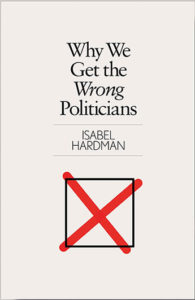I wonder what you will dip into over this holiday season by way of escape or relaxation?
I took a risk with this book. The title was arresting and the author the recognisable voice of BBC Radio 4s Westminster Hour. Of course we live in a complex and contested world and one where the quality of public narrative is inevitably variable but what are we to make of modern politics and those who choose this profession?
Hardman is a skilled guide for anyone who wants to understand how our political system works. It is baffling and full of pitfalls and ( to be frank ) shocking and at times unbelievable limitations and subjectivities. The most informative section of the book is its examination of how politicians get selected as candidates and then elected to parliament. Hardman draws upon her experience of listening to many candidates who did not succeed in getting elected. The cost and culture of this process reveals a deeply unsatisfactory collusion with a small group of unelected people who demand collusion and approval rather than independence and a spirit of service. The costs associated with the search for a nomination to a seat in a constituency limits the scope and character of those who succeed. In this and other ways, Hardman argues, our politics has real power to force individuals to be good or bad. Many examples are shared about the latter category. The core thesis that we get the wrong ‘sorts’ of people in politics is starkly put within this examination of the selection procedure.
Hardman turns her attention to political patronage and parliamentary one-upmanship. The system for passing laws is exposed as inadequate and she uses the example of housing policy to expose the flaws of reform that has not been work through.
We all want to make a difference and for some the search for and exercise of power is an important part of this (seemingly ) altruistic ethic. How does politics stay in touch with communities especially when we have such a lack of diversity on parliament? What kind of reality do politicians inhabit? What might it be reasonable of us to expect from them?
The prospect of 2019 is uncertain. Politics has the capacity to bind up, resolve, unite, reconcile and transform. Hardman asks us to listen more carefully to motivations and limitations. We need to engage and inform and take responsibility for the humanising of this power. What do we need to do to make a difference to our work and our communities ?
Hardman has offered a convincing analysis of the Westminster workplace. We glimpse something of the way politics does and does not work. Hardman offers a range of characters where we find obsessive souls, tortured hearts, hopes and dreams along with the inevitable ( perhaps? ) sex, love and scandal. But that as our Mothers would say is life – as we get over the problems this book challenges its reader to examine what we might do to get on with a better kind of politics.
James Woodward

